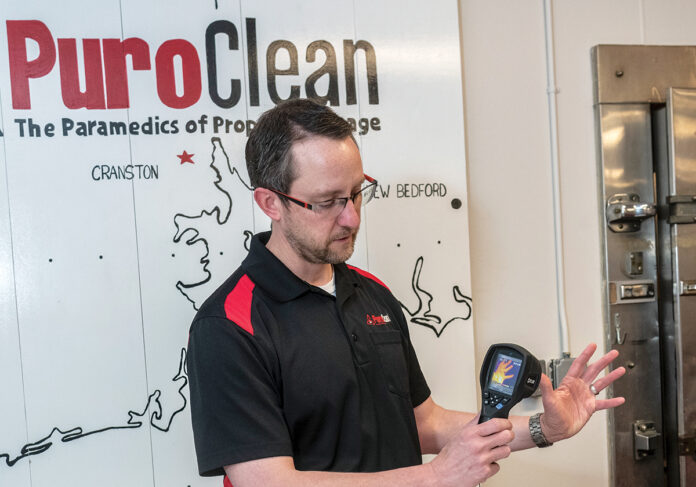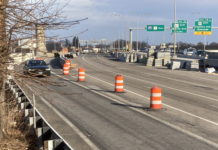While small businesses across the state and the country scrambled to secure one of the popular Paycheck Protection Program loans, Christopher Sanford applied for and received a forgivable loan for his franchise business without much fuss.
The U.S. Navy veteran and owner of PuroClean Disaster Restoration Services LLC in Cranston said his existing relationship with his bank helped him avoid the frenzied search for a lender to accept his application. Tuning in to the regular phone calls and Facebook videos that the U.S. Small Business Administration Rhode Island District Office offered also kept him informed on the latest deadlines and changes.
Perhaps more than anything, his military training and crisis instincts kicked in, keeping him calm despite the crisis unfolding around him.
“I just saw this as another challenging operating environment,” Sanford said. “I didn’t see it as a reason to hide my head in the sand and hope it gets better.”
His mindset paid off; the forgivable payroll loan proved crucial to helping his disaster and cleanup business continue running without any layoffs. And he’s not the only military-veteran business owner for whom this was the case.
An analysis by the U.S. Department of Veterans Affairs found that veteran-owned small businesses secured more PPP loans – and for higher dollar amounts – than their non-veteran counterparts. The working paper published in October is based on an analysis of smaller-dollar loans approved from April to June of 2020 and has not yet been peer-reviewed.
Whether the findings – that veterans received 3.5% more loans and 6.8% larger loans than non-veteran business owners – held true in Rhode Island is unclear. But efforts to help veteran business owners get a slice of the PPP pie was a major focus of the SBA Rhode Island’s pandemic efforts, along with connecting them to other funding, mentoring and technology resources, said Mark S. Hayward, district director.
An added benefit: military-veteran business owners may have been more familiar with the organization than the other small businesses the SBA was also reaching out to during the pandemic thanks to existing, veteran-specific loan and training programs.
‘I just saw this as another challenging operating environment.’
CHRISTOPHER SANFORD, PuroClean Disaster Restoration Services LLC owner
and U.S. Navy veteran
“We already have that trust factor with the veteran-owned businesses because we have that long-term relationship,” Hayward said.
Indeed, Sanford’s business relationship with the SBA dates back several years. He received one of the SBA’s long-term financing loans in 2018 to expand his franchise with a new, 9,500-square-foot headquarters. He’d also participated in training and mentoring programs through the Rhode Island Small Business Development Center and SCORE Rhode Island, both of which are affiliated with the SBA.
The VA study names access to quality VA medical centers as one reason why veteran-owned businesses may have fared better in getting PPP loans. While medical centers do not provide business services, they can act as a hub for information and resource-sharing, the paper stated.
This was not the case for Sanford, who had never been to the Providence VA Medical Center before receiving his COVID-19 vaccine there earlier this year.
Providence VA Director Lawrence B. Connell said the center saw little interest or inquiries from veteran patients about business services, nor did it publicize that information.
But the sentiment behind the VA study – that access to support organizations is helpful – makes sense, said Tyrone Smith, director of employment and business services for Operation Stand Down Rhode Island, a nonprofit that serves homeless and low-income veterans. Particularly in Rhode Island, the small and close-knit nature of the veteran community could be an asset for those business owners, Smith said.
The most recent data on state veteran-owned businesses is from a 2012 Census Bureau study. At the time there were 9,904 veteran-owned businesses, roughly 10% of the 94,642 total businesses statewide.
Sanford has relied on fellow veterans who own businesses both for contracts and as friends and sounding boards for his business decisions. He still has a few close, former military entrepreneurs with whom he checks in by phone regularly.
“You have that common bond in service and some level of trust,” he said.
Robert Mastin offered a different take. As a Vietnam War veteran, the ridicule he received after returning home from service made him steer clear of veteran-specific services, even as a business owner. Mastin also got a PPP loan for his Middletown coffee shop, Custom House Coffee, but never consulted with the SBA, the VA or any other organization for help, besides his bank.
Instead, he said his naval training was a differentiator in his business success.
“The leadership training I got in the military has really translated to the teamwork we foster here at Custom House Coffee,” he said. “That’s what really works. We have each other’s backs.”
Nancy Lavin is a PBN staff writer. Contact her at Lavin@PBN.com.












